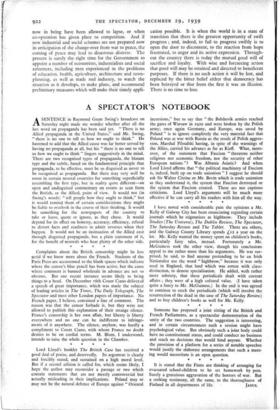Complaints about the British censorship might be less acrid if
we knew more about the French. Students of the Paris Press are accustomed to the blank spaces which indicate where the censor's blue pencil has been active, but the cases where comment is banned wholesale in advance are not so obvious. But one recent instance seems likely to bring things to a head. On December 26th Count Ciano delivered a speech of great importance, which was made the subject of leading articles in The Times, The Daily Telegraph, The Spectator and most other London papers of importance. No French paper, I believe, contained a line of comment. The reason was that the censor forbade it, but they were not allowed to publish this explanation of their strange silence. France's censorship is her own affair, but liberty is liberty everywhere and no one can be indifferent to infringe- ments of it anywhere. The silence, anyhow; was hardly a compliment to Count Ciano, with whom France no doubt desires to be on cordial terms. M. Blum, I understand, intends to raise the whole question in the Chamber.






























 Previous page
Previous page